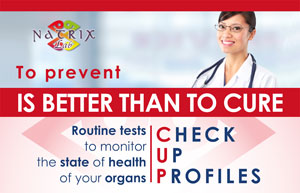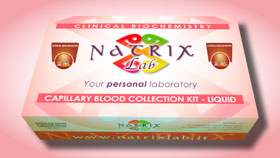What are they and what are they used for?
Check Up Profiles are a series of tests to evaluate our general state of health and prevent the main pathologies that affect Western society.
For example, cardiovascular risk: it is the number one cause of death in the world, and in Italy affects 160,000 people a year and is an asymptomatic pathology.
The NatrixLab test returns an indicator of the risk of developing a cardiovascular illness in the next ten years, and by adopting the right diet the risk can be reduced by 32% in men and by 27% in women.
The NatrixLab Check Up Profiles are:
- Lipid balance check-up
Analysis of cholesterol and triglycerides to monitor the effectiveness of any medication being taken, hypertension and people with increased cardiovascular risk; fundamental for preventing and monitoring metabolic syndrome, and other anthropometric measurements and anamnestic data. It is also a useful profile for women who are taking the contraceptive pill.
- Liver check-up
A complete profile that analyses the state of health of this very important organ, to evaluate or treat people with liver disorders, hepatic steatosis, who make excessive use of medication, alcohol, drugs, supplements, but also for clinically healthy people who want to prevent liver disorders arising.
- Kidney check-up
A complete profile that analyses the health parameters of our kidneys, to evaluate or treat people with kidney disorders, kidney stones, but also for clinically healthy people who want to prevent kidney disorders arising.
- Thyroid check-up
A complete profile to evaluate the concentration of the most important thyroid hormones, to evaluate or treat people with thyroid disorders, or who are at risk, or in subclinical situations of hypo- and hyperthyroidism.
- Prostate check-up
At the age of 45, men should begin controlling the state of their prostate, to prevent any problems and potentially serious illnesses. With our increased life expectancy and worsened lifestyle (stress, sedentary life, bad diet) these illnesses are on the increase and are often underestimated.
- Blood group test
Blood groups are determined by the presence of certain proteins on the surface of the red blood cells. It is very important to know your own blood group should you need, for example, a blood transfusion, for pregnant women to know their Rh factor, and also for anyone who simply wants to know what their blood group is.
Who should take the profiles?

Check Up Profiles are recommended for everybody to evaluate the general level of health and prevent numerous pathologies to our organs and various apparatus, but we recommend them above all in cases of:
- Hypercholesterolemia
- Hypertrygliceridemia
- Increased cardiovascular risk
- Hypertension
- Overweight/Obesity
- Metabolic syndrome
- Liver problems
- Kidney problems
- Hormonal imbalance
- Digestive problems
- Hectic and stressful life
- Incorrect, unbalanced or unvaried diet
Where and how to take the test?
The test involves analysing a blood sample, and can be requested in analysis laboratories, medical centres, health spas and pharmacies that offer NatrixLab diagnosis services.
Preparing for the exam: fast for at least 8 hours before the sample is taken.
…and afterwards?
If the values are altered, a special diet and associated perhaps with medication, if prescribed by a specialist, is able to reduce the risk of the pathology arising, and acts directly on the metabolic alterations that are behind it.
Moreover, diet and a correct lifestyle is our first weapon to prevent these alterations and to guarantee our better general health.
Repeating the test
We recommend repeating the test after 6 months. To monitor treatment or a pathology, we recommend repeating the test according to your doctor’s instructions.
Related tests
Related tests
Cardio Wellness Test

The “Cardio Wellness Test” is an indicator of the state of health of your cardiocirculatory system, and involves evaluating 12 parameters of the health of your heart, with integrations according to the latest indications from scientific research.
Find out more
Hormonal Profiles

The “Hormonal Profiles” provide fundamental information to identify any imbalances and to give pinpointed advice: food, nutritional-pharmaceutical, physical exercise, sleep quality and general wellbeing.
Find out more
Lipidomic Profile

The “Lipidomic Profile” is a test that systematically identifies the lipids, commonly known as fats, and their structural and functional nature in both physiological and pathological situations.
Find out more
Bibliography
- Uehara Y, Saku K High-density lipoprotein and atherosclerosis: Roles of lipid transporters. World J Cardiol. 2014 Oct 26;6(10):1049-59.
- Kim YA, Park YJ. Prevalence and risk factors of subclinical thyroid disease. Endocrinol Metab (Seoul). 2014 Mar;29(1):20-9.
- Stratmann B, Worms J, Tschoepe D. Diabetic cardiomyopathy/heart failure: news regarding etiology, diagnosis, therapy. Dtsch Med Wochenschr. 2014 Oct;139(40):2006-9.
- Lytvyn Y, Perkins BA, Cherney DZ. Uric Acid as a Biomarker and a Therapeutic Target in Diabetes. Can J Diabetes. 2015 Jan 16. pii: S1499-2671(14)00638-8.
- Cuzick J, Thorat MA, Andriole G, Brawley OW, Brown PH, Culig Z, Eeles RA, Ford LG, Hamdy FC, Holmberg L, Ilic D11, Key TJ, La Vecchia C, Lilja H, Marberger M, Meyskens FL, Minasian LM, Parker C, Parnes HL, Perner S, Rittenhouse H, Schalken J, Schmid HP, Schmitz-Dräger BJ, Schröder FH, Stenzl A, Tombal B, Wilt TJ, Wolk A. Prevention and early detection of prostate cancer. Lancet Oncol. 2014 Oct;15(11):e484-92.
 NatrixLab Laboratorio di analisi – nutrizionista
NatrixLab Laboratorio di analisi – nutrizionista

